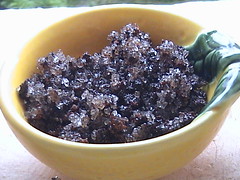gokudu

gokudu
Originally uploaded by rajiashine.
gokudu is telugu term describing the remains of pan while making ghee....
when the yogurt cream is heated in slow flame without disturbing, it forms a black burnt layer.
To make it edible, gokudu is mixed with sugar.
one should have it for its divine taste....hmmmmm





2 Comments:
I love your traditional recipes. We call the remanants 'kasandu'. It is great with sugar and as a side dish for rotis and dosas.
kasandu!!!
we call it godari some places :)
Post a Comment
<< Home